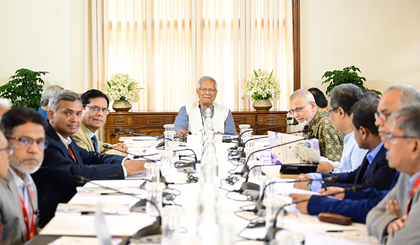Bangladesh: Members of reform commissions frustrated with Yunus government
By IANS | Updated: September 3, 2025 21:10 IST2025-09-03T21:08:16+5:302025-09-03T21:10:25+5:30
Dhaka, Sep 3 Several chairmen and members of reform commissions have voiced their frustration over the lack of ...

Bangladesh: Members of reform commissions frustrated with Yunus government
Dhaka, Sep 3 Several chairmen and members of reform commissions have voiced their frustration over the lack of visible progress in reforms under the Muhammad Yunus-led interim government.
They stressed that more than a year after the interim government assumed power, their roles have been mostly confined to submitting proposals, without meaningful implementation, local media reported.
Additionally, they highlighted that women's perspectives are being pushed aside in the reform process.
These remarks were made at an event organised by the Citizens' Platform for Sustainable Development Goals (SDG), Bangladesh, which also witnessed the launch of a new initiative titled 'Bangladesh Reform Watch'.
Despite the establishment of 11 commissions in two phases, six in the first phase and five in the second phase, aimed at driving reforms across various sectors, the speaker said, these have yielded negligible results.
"What was in place earlier is still there. Local government, media, health, and women's commissions are in the weakest state. Those who worked hard in the hope of reforms are now disheartened because nothing has moved beyond report writing," Bangladesh’s leading newspaper, The Daily Star, quoted Tofail Ahmed, chairman of the Local Government Reform Commission, as saying.
Labour Reform Commission Chairman Syed Sultan Uddin Ahmed expressed disappointment over the non-implementation of essential reforms, including minimum wage and workers' rights.
“We didn't expect reforms overnight, but at least some activities should have begun. That hasn't happened, which is deeply frustrating,” he stated.
Members of the Women's Affairs Reform Commission also raised concerns over sidelining the women's commission and an alarming spike in gender based violence across Bangladesh.
“Among all the commissions, the Women's Affairs Reform Commission is in the weakest state. Over the past year, women's rights have not been established, nor has violence against women declined. In some areas, particularly the Chittagong Hill Tracts, the situation has worsened,” said Nirupa Dewan, one of the members of the Commission.
Meanwhile, noted Bangladeshi economist Rehman Sobhan said, “If reforms are not completed, the election may be in danger, and some people may not participate in it. But what is not clear is which reforms must be carried out.”
Furthermore, Debapriya Bhattacharya, distinguished fellow at Dhaka-based think tank Centre for Policy Dialogue (CPD), questioned the halt in the interim government's reform initiatives. He also stressed that reform committees lacked representation from marginalised groups, minorities, and disadvantaged communities.
“Discussions were mostly with political figures, leaving out ordinary citizens. As a result, reform proposals could not move forward,” he stated.
Bhattacharya remarked that amid political developments and election preparations, the interim government seemed to have "lost its path"
Shaheen Anam, Executive Director of Manusher Jonno Foundation, questioned why the issues of children -- particularly street children and child labourers -- were excluded from the reform agenda. She observed that with equality, poverty, child abuse, violence, and attacks on minorities on the rise, Bangladesh is unlikely to meet the SDGs.
Disclaimer: This post has been auto-published from an agency feed without any modifications to the text and has not been reviewed by an editor
Open in app